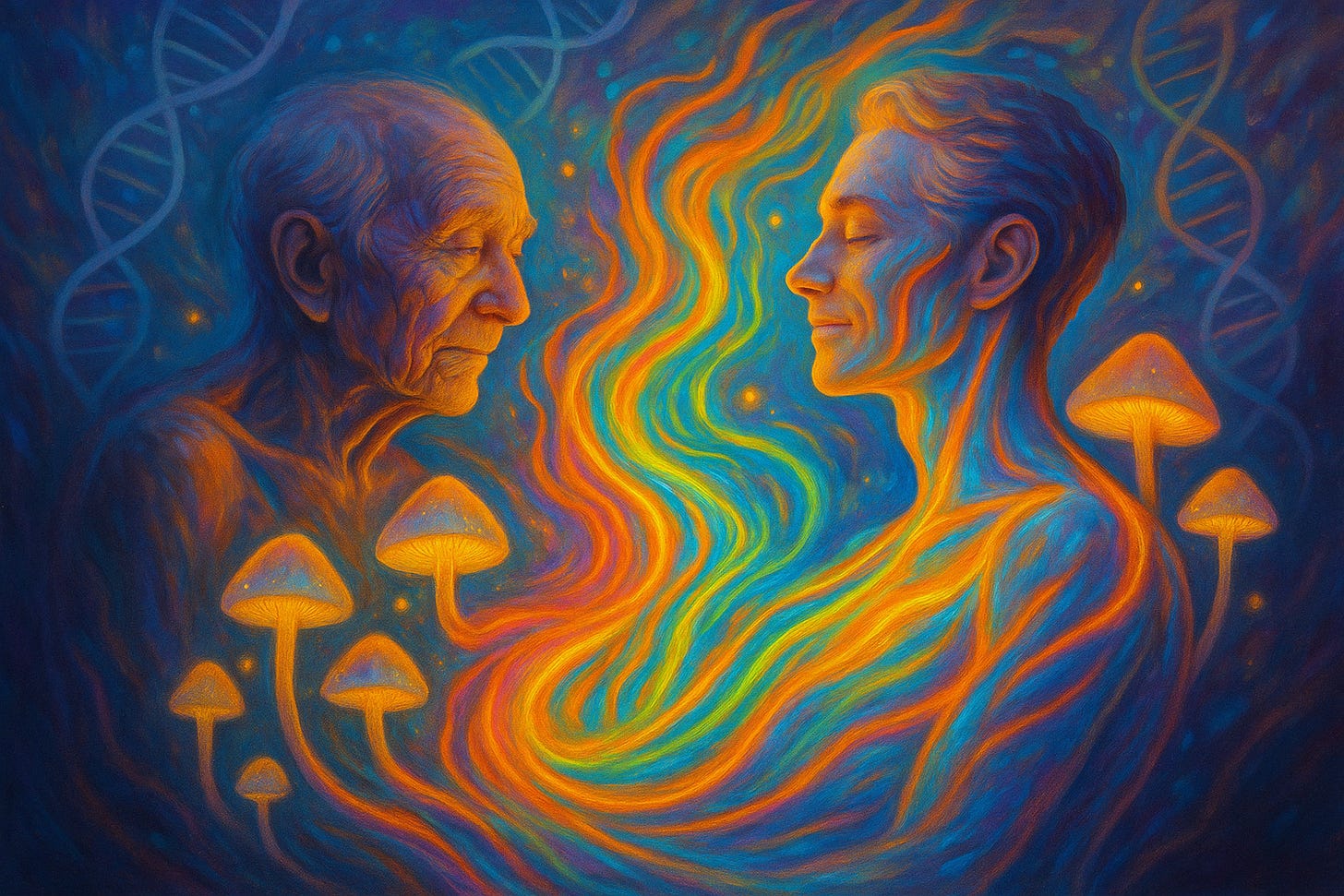Could Magic Mushrooms Unlock Longer Life? Psilocybin Delays Cellular Aging and Boosts Mouse Survival
Psilocybin, the psychedelic compound in magic mushrooms, extends cell lifespan and enhances longevity in aged mice—hinting at anti-aging potential.
Have you ever thought a single compound could rewind the clock on your cells, fighting off the wear and tear of aging? That's the surprising twist from a new study on psilocybin, the active ingredient in magic mushrooms, which shows it can delay cellular senescence and even extend life in older animals. This research is immediately relevant for anyone chasing longevity, as it points to psilocybin's role in tackling hallmarks of aging like oxidative stress and telomere shortening, potentially opening doors to new therapies for age-related decline.
What's the Big Idea
At its core, this study tackled a bold question: Can psilocybin, famous for its mind-altering effects, actually slow down biological aging? Researchers tested psilocin (psilocybin's active form) on human lung and skin cells in the lab, finding it extended cellular lifespan by up to 57% by delaying senescence—the point where cells stop dividing and start contributing to aging. Think of it like giving your cells extra mileage before they hit the "retirement" phase.
In live animals, they gave monthly doses of psilocybin to 19-month-old female mice (equivalent to about 60-65 human years). Over 10 months, treated mice had an 80% survival rate compared to 50% in the control group. The key? Psilocybin seemed to preserve telomere length (those protective caps on DNA that shorten with age), reduce oxidative stress, and boost anti-aging proteins like SIRT1. As the authors put it: We provide the first experimental evidence that psilocin treatment extends cellular lifespan and psilocybin treatment promotes increased longevity in aged mice, suggesting that psilocybin may be a potent geroprotective agent.
Why Should You Care
This isn't just lab trivia—it could reshape how we approach longevity and healthspan. For everyday habits, imagine incorporating low-risk interventions that mimic psilocybin's effects on stress reduction and cellular repair, potentially adding years of vibrant living.
Habits and Lifestyle: The study links psilocybin to lower oxidative stress, which ties into practices like meditation or antioxidant-rich diets that might amplify similar benefits without the psychedelic trip.
Therapies: It supports psilocybin's use in treating age-related issues like depression or neurodegeneration, with lasting effects that could improve cognition and physical resilience in older adults.
Long-Term Healthspan: By preserving telomeres and delaying cell aging, this could mean fewer age-related diseases, better energy levels, and sharper minds as we get older. Notably, effects were seen in "late-life" mice, suggesting benefits even if you start later in life—though lifestyle factors like diet or exercise might influence outcomes, and the study highlights potential gender differences (only female mice were tested, with hints that males might respond differently based on prior research).
What's Next on the Horizon
The door is wide open for exciting follow-ups. Researchers could explore how psilocybin tweaks epigenetics—the software of our genes—to lock in these anti-aging effects long-term. Innovations like microdosing protocols or synthetic versions might make this accessible without full psychedelic experiences.
Practical next steps: Track emerging clinical trials for psilocybin in aging populations, or experiment with SIRT1-boosting supplements (like resveratrol) as a low-stakes way to test similar pathways.
Lingering questions: Does it work the same in humans? What about starting treatment earlier in life, or combining it with other longevity hacks like fasting? And crucially, how do age, gender, and lifestyle (e.g., high-stress vs. active) modify results? More studies on male animals and diverse human groups are needed to clarify.
Safety, Ethics, and Caveats
Psilocybin has a strong safety profile—it's been called a "breakthrough therapy" by the FDA with minimal adverse effects in trials—but it's not without risks. As a Schedule I drug, access is limited, raising ethical concerns about equitable research and potential misuse. The study warns of unknowns like long-term dosing effects on cancer risk (delayed cell senescence might inadvertently promote tumors) or interactions with medications.
Limitations include: Only female mice were used, so sex-specific effects remain unclear (prior rodent studies suggest females might respond more strongly to psilocybin's behavioral impacts). In vitro results were on specific cell types, not whole humans, and mouse doses were higher than typical human therapeutic levels due to faster metabolism. Always consult professionals; self-experimentation could lead to psychological distress or legal issues. Age matters too—benefits were seen in older mice, but efficacy in very elderly or frail individuals is untested.
What This Could Mean for You
Ready to apply this? While psilocybin isn't DIY yet, here's evidence-based advice to tap into similar anti-aging mechanisms safely:
Boost SIRT1 Naturally: Incorporate foods like blueberries or dark chocolate, or try intermittent fasting—studies show these activate SIRT1, mirroring psilocybin's effects on cellular repair.
Combat Oxidative Stress: Aim for daily antioxidants via a Mediterranean diet (think leafy greens and nuts) and moderate exercise; this could reduce telomere shortening, especially if you're over 50 or lead a high-stress life.
Consider Microdosing Mindfully: If legal in your area (e.g., through clinical trials), explore guided psilocybin therapy for mental health benefits that indirectly support longevity—start low and monitor with a doctor, noting potential gender differences (women might see stronger stress-relief effects based on related research).
Personalize by Demographics: If you're female or in mid-to-late life, this might align well with your biology; men or younger folks should wait for more data. Track your own biomarkers like telomere length via at-home tests to gauge progress.
These steps are practical bridges until more human trials confirm psilocybin's role—think of them as training wheels for a longer, healthier ride.
Explore the Full Study
"Psilocybin treatment extends cellular lifespan and improves survival of aged mice" by Kosuke Kato et al. (2025). Read the original study here: https://doi.org/10.1038/s41514-025-00244-x.


